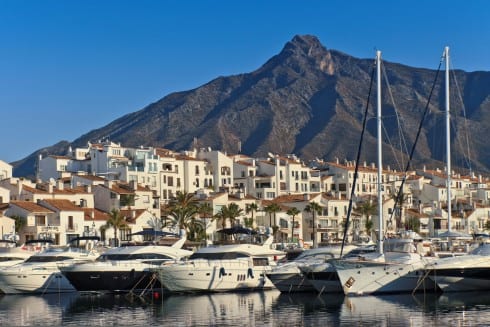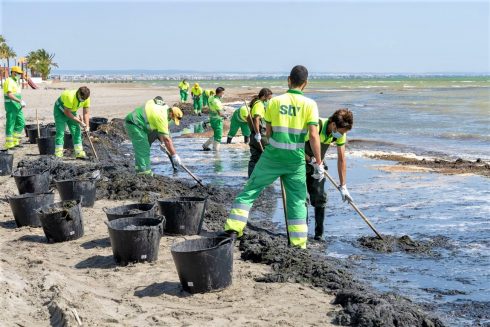A PUFF of smoke is the first big give-away. Next you’ll see a line of battered old cars, followed by a huddle of people, usually with a spread of ages almost in the triple figures.
Yes, it is the olive harvest time again and around Andalucia almost every olive grove will be reverberating to the sound of the local patois.
Spaniards from all walks of life have been given the three line whip to head to their family’s olive groves to help collect the country’s most successful export.
No matter how busy your week has been, there is no way you can wriggle out of the annual olive picking season.
Be it city slicker, nurse or schoolchild, it makes no difference. The centuries-old tradition sees the whole family mucking in to reap the fruits of this year’s labour.
Picnics, music, laughter, not to mention a fair bit of graft, from now until the season draws to a close in February, most weekends are taken up with olive-picking.
And that is perhaps what makes Andalucia’s olive oil so special. Although recognised as the world’s leading producer of olive oil, the country has still has not forgotten the foundations on which this success was built.
Of the one million tonnes of oil produced annually in Spain, around 80 per cent comes from Andalucia, dwarfing other regions such as Extremadura and Catalonia.
“It doesn’t matter how busy my week has been,” explains masseur and spa centre owner Jose Antonio Coca. “Once the weekend comes I am picking olives.”
Despite running his busy centre in Arriate, near Ronda, Coca, 34, heads off at the crack of dawn on Saturday morning to his fiancée’s parents smallholding in Los Corales, near Campillos.
He’ll be there for the whole weekend, until heading back at dusk on Sunday, ready for another hard week running his own business.
“There is no way of getting out of it and it is a lot of hard work, but the olive harvest is actually a lot of good fun,” he explains.
Aside from all the banter, the long lunches out in the fields and the obvious benefits of fresh air, he ends up with a year’s supply of some of the tastiest, not to mention healthiest, olive oil in the world.
For the oil produced in Andalucia, is widely considered to be – alongside Italy’s – the best in the world.
Of the one million tonnes of oil produced annually in Spain, around 80 per cent comes from Andalucia, dwarfing other regions such as Extremadura and Catalonia.
On top of that, of the six special appellations – or denominaciones de origen (DOs) – handed out by the Spanish authorities in recognition of exceptional quality, four are in Andalucia.
These are Priego de Cordoba and Baena, in Cordoba, and Sierra Magina and the Sierra de Segura in Jaen.
Exported all over the world, many of the producers in these four regions are producing extra-virgin oils with near-zero acidity, the crème-de-la-crème of the oil world.
It is one of the qualities that has gained the product a reputation as a vital aid to health – Spaniards’ markedly low susceptibility to conditions such as coronary heart disease is attributed to their olive-oil rich, low-cholesterol diet.
It is not for nothing that Spanish women have the longest average lives in the world, only beaten by the Japanese.
Indeed, there is saying in Spain that ‘olive oil cures all ills’. I have heard it various times during my journeys around Spain.
No less though, than from one old boy in a cafe, near Baena, who told me that his 95 years of age, almost certainly had much to do with his daily imbibing of the amber nectar on his daily mollete – or bread roll.
Olives were first introduced to Andalucia by the ancient Phoenicians in 1050BC, but, ironically, were initially snubbed by the natives who continued to cook using lard.
It was not until the arrival of the Romans that the region began to embrace its natural treasure, and acquired a reputation for producing the finest oil in the empire.
Indeed, so good was its reputation, that gallons of the stuff were shipped back to Rome, where it became a local delicacy for the wealthiest families in Rome.
Its importance has been confirmed with the discovery of amphoras, or jugs, stamped with local Spanish logos, in dumps on the outskirts of the Italian capital.
“It was without a doubt one of the earliest forms of branding,” explained archaeologist Antonio Fernandez Ugalde from Ecija’s history museum.
“Local Roman families produced their own oils and shipped them to Rome with their own individual stamps. The best of them got cult status and people paid good money for them.”
Centuries later, it was the Moors who brought far better cultivation techniques, many of which have lasted to this day.
Coincidentally the Spanish name for olive oil – aceite – is taken directly from the Arabic word az-zait.
It was the Moors who really encouraged the planting of olive trees in the region, but the production increased in Christian times until it became a huge industrialised process.
These days, the majority of Andalucia’s olive groves are owned by a handful of large landowners. The dominance of this one crop in large parts of the region – in particular Sevilla, Cordoba and Jaen – means that unemployment rises by up to 25 per cent in some areas after the olive harvest has ended.
Many of these big producers work on bulk and use countless herbicides, pesticides and mechanical harvesters, which has taken some of the hard labour out of the growing and harvesting process.
But this has led to a poorer quality product and with the insistence of killing back any weeds and ploughing up the land between trees, it has often led to severe soil erosion.
There are however, a large number of smaller, more bespoke, producers, who try to work as organically as possible.
Many of these choose to ignore modern methods preferring the age old methods of production.
Their insistence on tradition is quickly visible in the landscape, where instead of the typical bare red earth between trees, many of the ecological fincas sport lush meadows, the living proof of organic farming methods.
At some of the best the olives are individually picked by hand, rather than being knocked off the trees by sticks or mechanical shakers.
A team of six strips an average size tree at one of Spain’s most acclaimed producers Nunez del Prado, in Baena, in around 20 minutes.
Fallen olives are left on the ground as they might be damaged and spoil the eventual flavour of the oil.
The organic olive oil produced here has been hailed for its zero acidity and according to the head of the family business, Paco Nunez de Prado, the secret to its success is rather simple.
It is not for nothing that its golden nectar is a huge hit in American and Japan, and is now selling in some of Britain’s most famous shops, including Sainsbury’s and Harrods.
“Making good olive oil is about paying attention to lots of small details,” he explains. “It is important not to bruise the fruit, otherwise the oil has higher acidity and less delicacy.”
He and his brother Felipe are the seventh generation of a family that has been making olive oil at the same mill in Baena since 1795.
Nowadays they are a well organised commercial venture and lunch at Nuñez de Prado’s restaurant features almonds fried in extra-virgin olive oil, pork medallions in extra virgin oil with garlic and parsley pesto, followed by oranges in honey and olive oil, and olive oil ice cream.
Eccentric perhaps, but to those born and bred in Andalucia’s olive heartland, a fitting celebration of a national treasure.
Nearby, in the award-winning Priego de Cordoba DO area lies another highly-rated estate run by Aceites Vizcantar, which incredibly still uses some olives from trees over thousand years in age.
In total, the family run business – which has recently won awards in Italy and Argentina as well as the much coveted Medallo de Oro gold medal for intensity of flavour – has three so-called ‘milionario’ trees.
“Next year we are planning to do a special olive oil picked from just these three trees,” reveals boss Fermin Rodriguez Jimenez, 50, who lives in the heart of the 180 hectare estate.
Slowly built up over nearly a decade (his grandfather bought 30 hectares in 1946, while his father bought another 30 in 1975) the company uses the oil from three different types of trees, including Picudo, Picual and Hojiblanca.
As well as producing four different brands of oil, including an organic one, in 2010 the company will be producing shampoos, face creams, soaps and even perfume.
It is also regularly organising catas – or tastings – and trips can be organised to go out and visit the ancient trees.
“I am working with my whole body and soul to improve our product and we realise that the side products are getting increasingly popular,” explains Jimenez.
“I am completely dedicated to the world of the olive. In fact I live and breath it, seven days a week.”
It is this sort of attitude towards the creation of flawless olive oil that has inspired Andalucia to national greatness.
One olive-growing farm, offering organic oil is Oleum Viride, near beautiful Zahara de la Sierra. Just five years old, the finca is causing quite a stir, not just in Spain, but also across the Atlantic.
Run by Luis Lucero Hernandez, the farm is a testament to great marketing. Last year, it recently unveiled a range of fashionable olive oil bottles that would not look out of place on the Queen’s dining-room table.
And that, as it happens, is the case, with Queen Sofia of Spain said to regularly user, while recently at a high-profile award dinner in New York, organised by the Queen’s Spanish Institute, bottles were handed to among others Bill Clinton and Penelope Cruz.
However, despite mixing with the rich and famous, the Oleum Viride finca still allows local olive growers their own olives, which can be turned into oil in just two hours.
Costing just 18 centimos per kilo, it is proving to be a popular option for many.
Nearby, just a five-minute drive away lies, el Vinculo, a complete contrast to its more glamorous olive oil producing neighbour.
For this farm is steeped in tradition and history, dating back an impressive 500 years. Owned by the hard-working Juan Topete the farm certainly does bring new meaning to the phrase, Olive Press!
Topete still relies on the tried and tested methods that have served his family for years and a trip around the production floor evokes images of how the process has been undertaken for centuries.
“Although it looks mechanised and heavily regulated, the truth is that making olive oil is really an art,” explains Topete.
Unsurprisingly romantic traditions on which olive oil production is based have even captured the imagination of some of Andalucia’s rich and famous.
Bullfighter Jesulin de Ubrique, from Cadiz, now owns his own exclusive olive growing farm in Jaen, while Hollywood star Antonio Banderas, who heralds from Malaga, has become the face of Hojiblanca olive oil – based in Antequera – to help promote its name in the United States.
He even bought a 10 per cent stake in the firm to help it take on the Italian-saturated market across the Atlantic.
With supporters like these – backed up by the dutiful Andalucian families out in the groves each weekend through the winter – the future of the region’s world-famous produce is not just rosy, it is golden.








